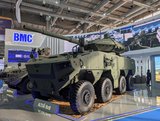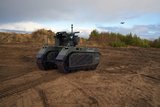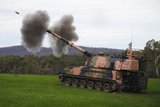Boeing’s IFPC Inc 2 Second Interceptor proposal includes “a novel all-up-round solution”
Indirect Fire Protection Capability Increment 2 system. (Photo: US Army)
Boeing announced last week that its bid was selected by the US Army to advance to the next phase of the Indirect Fires Protection Capability (IFPC) Increment 2 (Inc 2) Second Interceptor competition. An official spokesperson for the company told Shephard that the supplier’s proposal includes “a novel all-up-round solution”.
“Our design is affordable and offers increased magazine depth with a missile that provides enhanced speed to target, greater range and manoeuvrability for sustained engagement against evolving threats,” the official stressed.
The system is intended to fill a capability gap between short- and long-range air defences against low-flying, mid-range threats, such
Already have an account? Log in
Want to keep reading this article?
More from Land Warfare
-
![US Army plans Q2 prototype proposal request for its Mobile Tactical Cannon programme]()
US Army plans Q2 prototype proposal request for its Mobile Tactical Cannon programme
The US Army is seeking a mature 155mm, wheeled, self-propelled capability to replace the towed M777 howitzer in the Stryker, Mobile and Infantry Brigade Combat Teams as it targets a potential 498-unit acquisition goal.
-
![British Army’s Project Stokes 120mm mortar bids due in March 2026]()
British Army’s Project Stokes 120mm mortar bids due in March 2026
Project Stokes could see a new 120mm mortar capability enter British service, with domestic production and international partnerships central to competing bids.
-
![MKJ Warrior Series — The Nett Warrior Qualified Connector for Today’s Soldier Systems]()
MKJ Warrior Series — The Nett Warrior Qualified Connector for Today’s Soldier Systems
ITT Cannon’s MKJ Warrior connectors are designed for the harshest environments, delivering mission critical comms, navigation and USB data/power.
-
![Active vehicle protection comes to the forefront as Trophy and Iron Fist secure contracts]()
Active vehicle protection comes to the forefront as Trophy and Iron Fist secure contracts
Experience on the battlefield is accelerating the adoption of active protection systems as technologies continue to evolve to reflect shifting global defence needs.
-
![World Defense Show 2026: Hanwha increases Middle East presence and reveals Tigon 6x6 sale]()
World Defense Show 2026: Hanwha increases Middle East presence and reveals Tigon 6x6 sale
Shephard sat down with Hanwha Middle East and Africa president Sung Il at World Defense Show 2026 to hear about the company’s plans for the region and how it plans to use local industry success to win deals.

























